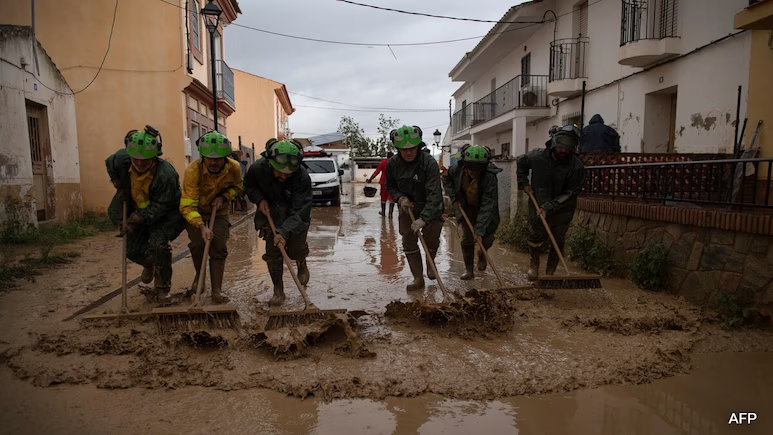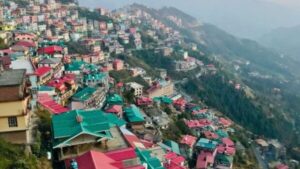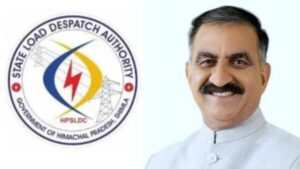
Some 155,000 homes were without electricity in Valencia, Spain.
Sedavi: Rescue workers rushed Thursday to find survivors and victims of floods that killed at least 95 people and left towns submerged in mud, with overturned cars strewn across streets.
About 1,000 soldiers joined police and firefighters in the search for bodies in the Valencia region as Spain began three days of mourning. Regional Policy Minister Angel Victor Torres predicted late Wednesday that the death toll would rise because “many people are missing.”
The eastern city of Valencia and its surroundings received a year’s worth of rain in just a few hours on Tuesday, flooding towns and villages with water and mud.
The worst hit was Paporta, in the Valencia suburbs, which killed about 40 people, including a mother and child, officials said.
Rescue teams used helicopters to pull survivors from rooftops while others searched homes, some of which were neck-deep in water.
As dawn broke on Thursday, thousands of homes were still without electricity and drinking water and many roads were blocked by the debris of hundreds of cars and trucks swept away by flash floods.
Carlos Mazon, the head of the Valencia regional government, said emergency services had carried out 200 rescues on the ground on Wednesday and 70 people by air.
Valencia’s emergency services announced a provisional death toll of 92 people, adding that bodies were still being recovered. Two people were killed in neighbouring Castilla-La Mancha and another was reported dead in Andalusia to the south, officials said.
AFP journalists saw piled-up cars and muddy roads in the suburb of Cedavy, a city in the Mediterranean, Valencia.
Stunned residents struggled to clear mud and water from their homes.
‘Spain is crying’
In Ribarroja del Turia, on the outskirts of Valencia city, town councillor Esther Gomez said workers were trapped overnight in an industrial estate with “no chance to rescue them” as drains overflowed.
“It’s been a long time since this happened and we are scared,” she told AFP.
Chiva, west of Valencia, recorded 491mm of rain in just eight hours on Tuesday – the equivalent of almost a year’s worth of rainfall, according to Spain’s weather service AEMET.
“All of Spain weeps with all of you … We will not abandon you,” Prime Minister Pedro Sanchez said in a televised address to victims and their families.
Sanchez was to leave for Valencia on Thursday.
He said the disaster could not be considered over yet and “we will deploy all the necessary resources to recover from this tragedy, until it is no longer needed.”
King Felipe VI said he was “deeply saddened” by the disaster and offered “heartfelt condolences” to the families of the victims.
Damage to the telephone network and flooded streets hampered efforts to reach affected communities, but rescue teams had access to all urban centers restored by Wednesday evening, Mazzone said.
Energy company Iberdrola said about 155,000 homes in the Valencia region were without power because of the storm.
The EU activated its Copernicus satellite system to help coordinate Spain’s rescue teams, EU Commission chief Ursula von der Leyen said in Brussels.
The bloc has also offered to use its civil protection mechanism to send further reinforcements, she said.
Warning systems checked
Authorities in the Valencia region announced that survivors were being sheltered in temporary accommodation such as fire stations.
Rail and air transport remained severely disrupted. The Edif rail infrastructure authority announced that the high-speed line between Valencia and Madrid would remain suspended for at least four days.
The death toll from floods is Spain’s highest since 1973, when at least 150 people were estimated to have died in the southeastern provinces of Granada, Murcia and Almeria.
Scientists have warned that extreme weather events like the storm that hit Valencia are becoming more intense, last longer and occur more frequently as a result of human-induced climate change.
Lesley Mabon, senior lecturer in environmental systems at Britain’s Open University, said such extreme conditions “could overwhelm the capacity of existing defences and contingency plans, even in a relatively prosperous country like Spain.” Hannah Cloke, a professor of hydrology at the University of Reading, said the fact that such a high number of deaths occurred after heavy rain warnings showed Valencia’s flood warning system failed.

Continuing the achievement of the journey of effectiveness and credibility of more than 10 years in the career of journalism, as a woman journalist, I am Serving as the founder, promoter and editor of DiaryTimes with the trust and support of all. My credible coverage may not have given a big shape to the numbers, but my journey presents articles that make you aware of the exact and meaningful situations of Himachal’s politics, ground issues related to the public, business, tourism and the difficult geographical conditions of the state and financial awareness. DiaryTimes, full of the experience of my precise editorial expertise, is awakening the flame of credible journalism among all of you, so that the eternal flame of meaningful change can be lit in the life of the people of the state and the atrocities being committed against the people can be brought to the fore, I am motivated for that. If even a small change comes with the power of my journalism and the whole world becomes a witness to that issues, then I will consider myself fortunate.





